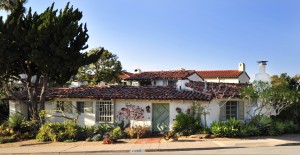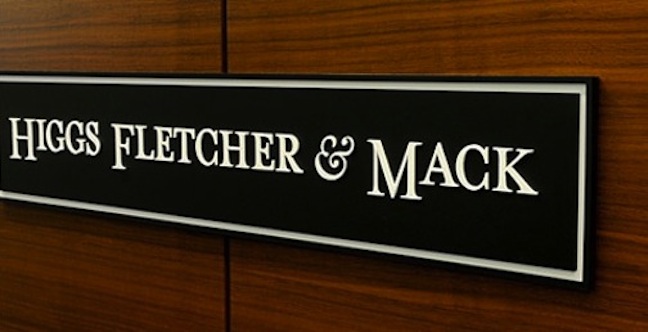Home Tour celebrates Cliff May’s classic hacienda style
SOHO event focuses on Kensington/Talmadge, Presidio Hills, Loma Portal

By Alana Coons
Photos by Sandé Lollis
Designer Cliff May’s earliest, hacienda-style homes from 1932 to1936 will be open together for the first time during Save Our Heritage Organisation’s annual Home Tour Weekend March 26 and 27.
The day-long, self-guided home tour on March 27 will invite visitors inside five rustic, adobe-like homes with multiple beehive fireplaces and large, walled courtyards in the historic neighborhoods of Talmadge, Presidio Hills and Loma Portal.
A classic home designed by May, a San Diego native who went on to be nationally known as “father of the ranch house,” will be the site of a cocktail party on March 26. On both days, SOHO’s Museum Shops at the Marston House and the Whaley House will feature select Spanish Revival and California Ranch House furnishings, period décor and books on architecture, preservation and do-it-yourself projects.
All proceeds from the Historic Home Tour Weekend benefit SOHO, San Diego’s largest preservation organization, in its advocacy and educational work to protect San Diego County’s historic architectural, archeological and cultural heritage, sites and landscapes. Founded in 1960, SOHO recently received a 2011 Governor’s Award for the documentary it produced on its history and role in San Diego’s preservation movement.
The colorful, little-changed haciendas on the SOHO tour demonstrate the impact of May’s own rancho roots on his vision and designs for casual, indoor-outdoor living in Southern California that eventually spread across the nation.
Visitors can retrace the first creative steps of the entrepreneurial May (1909-1989), a sixth-generation native San Diegan and descendant of the Estudillo family. He spent his youth roaming or riding around authentic Spanish-Mexican adobe homes, including his Aunt Jane Magee’s Rancho Santa Margarita y Flores, now part of Camp Pendleton, and La Casa de Estudillo, now in Old Town San Diego State Historic Park.
May, who was not trained as an architect, began his design career designing and making furniture. He completed his first several haciendas, which were spec houses, with furniture, hardware, lighting fixtures and landscaping he designed or selected to complement the rustic, faux-adobe architecture that recalled old California. A natural at marketing, May did this to spur sales during the Great Depression and to reinforce the historic pleasures of indoor-outdoor living in single-story homes that hugged the earth.
The tactic worked so well that May’s first hacienda — the Arthur J. and Frances O’Leary house (1932), which is on the tour — sold for $9,500 when its designer was only 23. Like May’s family homes, this U-shaped residence rambles around a large, walled courtyard, which is intended to be the main living room. Entry is through a rough-hewn front door, which leads to the courtyard. Passage into the house itself is from a veranda, or corredor, equipped with several pairs of French doors. With its roof providing protection from the sun and rain, the furnished veranda serves as transitional living space between indoors and out. The single-story house is built at ground level, making it seem like an old adobe rising out of the earth.
Word spread about the enterprising young May and his hospitable hacienda. He continued to build haciendas similar to the O’Leary House, but with modifications that visitors on the SOHO tour can trace for themselves. His second spec house in Kensington (the Captain and Mrs. William Lindstrom House, a National Historic Landmark, built in 1933 and another stop on the SOHO tour) also sold quickly with all its furnishings.
By this time, May had attracted the attention of the media and civic leaders. “Cliff May is one of the most interesting young men in San Diego,” begins a story published in The San Diego Union in 1933. It didn’t hurt that his future father-in-law, developer and real estate agent Roy C. Lichty, was one of his backers.
May received his first commission from Dr. John Beardsley, for whom May produced another hacienda (1933) with thick walls, red-tiled roof and heavy wood doors and window grilles in Loma Portal. Businessman and developer George Marston offered May a lot to build on in Presidio Hills, where the young man constructed another rambling hacienda (the Alex Highland House,1934) that hugs a street corner. Both of these homes are also featured on the SOHO tour.
Between 1932 and 1937, May designed about 50 courtyard haciendas in the San Diego area. He moved to Los Angeles in 1936, but retained close ties with his birthplace. His business and reputation took off in Los Angeles, where he developed the suburban ranch house in response to the great need for post-World War II housing.
During a career that spanned more than 50 years, May designed thousands of ranch houses, a modern version of the single-story hacienda with easy indoor-outdoor connections. These designs and the suburban lifestyle they represented were promoted by Sunset and other national magazines. He became so well known that Sunset published the book “Western Ranch Houses” by Cliff May, which combined May’s philosophy of living with architectural plans that were built throughout the country. He also designed custom homes for Hollywood clients such as Gregory Peck and Shirley Temple Black. His own home, Mandalay, became a showpiece. May was still working when he died at age 81.
For more information on the SOHO Historic Home Tour Weekend events and to purchase tickets, visit sohosandiego.org or call (619) 297-9327 or (619) 297-7511.
Alana Coons is senior editor of the SOHO publication staff. Sandé Lollis is associate editor and a graphic artist, photographer and Webmaster.


